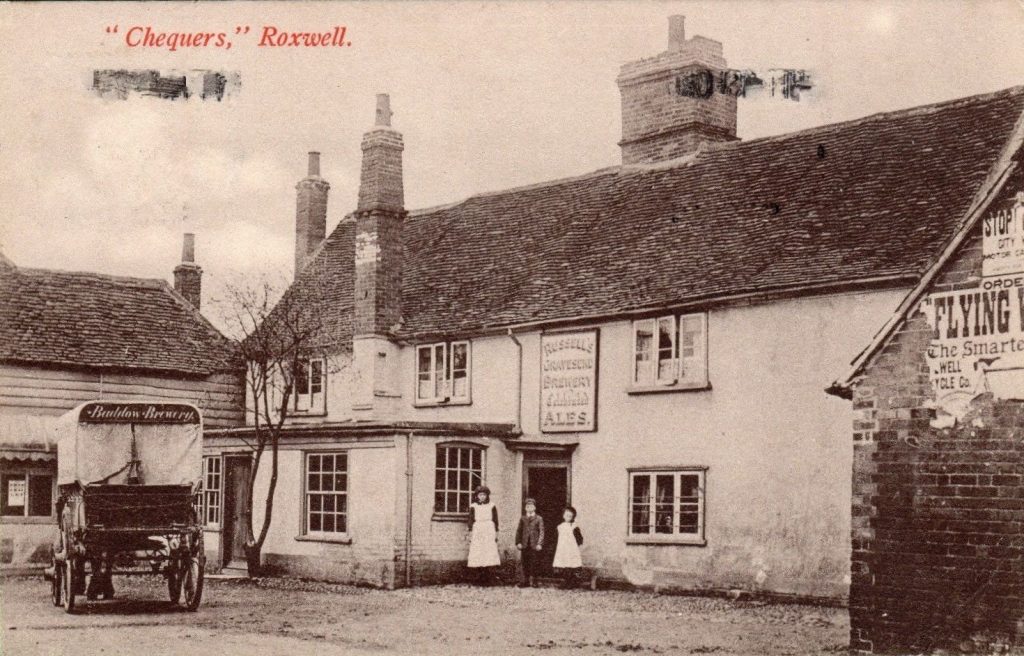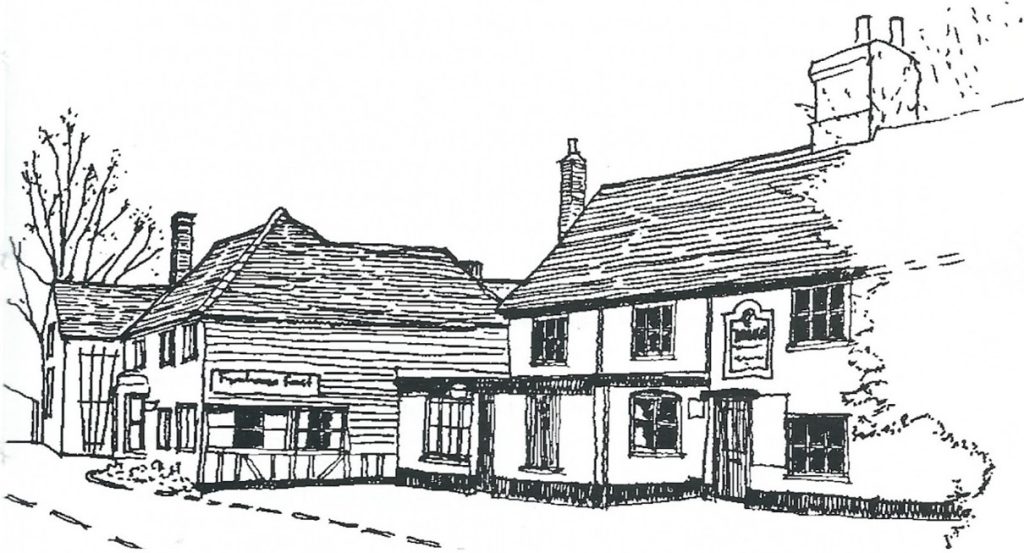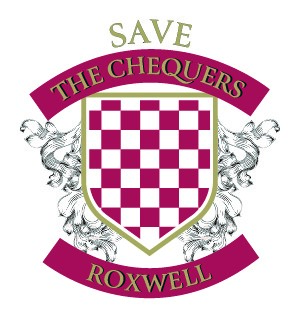You may not know already that the Chequers has a history dating back to the 1770s as a public house, but the building is actually older with a traced past in our local records.

The above postcard is believed to be c1900 and recently appeared on the Facebook Group “Chelmsford Remembered”. Many of the details of the building are still recognizable today.
The following excerpt is from “Roxwell Revealed” (1993) with kind permission of the authors.
The Chequers (from the chapter Aleshouses, Tippling Houses and Pubs in Roxwell Revealed)
Much of the early history of the Chequers is a matter of conjecture, and attempting to interpret any clues which may appear in old records.
In a Manorial Survey dated 1566 two small tenements named “Mutwells and Rowges” with a garden and 1 rood of land were rented from the Lord of the Manor with the property known as Broadgates. The description of the location makes it obvious that these were on the site of what is now the Farmhouse Feast. Towards the end of the 16th century one was converted into a Malthouse and records continue to refer to this right up to the middle of the 18th century.
During the late 17th and early 18th century members of the Perry family held Broadgates, and the inventory taken on the death of Christopher Perry in 1673 mentions the malthouse & granary, and brewing vessels in the Bruehouse (sic). The Royal Commission on Historical Monuments report published in 1921 says that the Chequers was built early in th 17th century, so this was probably during the lifetime of Christopher Perry.

(Note in the above illustration, The Farmhouse Feast is the house on the left, an 18th century and later timber-framed and plastered house.)
Christopher’s widow Anne married again in 1676, Edward Allen, a widower. The Allen family was a large one, and for many years had held property in different parts of Roxwell. Edvard was a blacksmith and also a brewer. It would appear that when he married Anne Perry he took over some of the property including Mutwells & Rowges. He died in 1686, and in his will he mentions households goods in “my house called Broadgates in Roxwell”.
By 1715, one of his sons, Francis, who was a victualler, was living there. Another of Edward’s sons, Richard, was a maltser at Boyton Cross. Francis Allen was an important local personality, being one of the two Constables in Roxwell. In 1696 he was elected Beadle of the Manor and in 1709 Bailiff – these two offices being for the whole of the Manor of Writtle.
Francis made his will in 1715 and bequeathed to his wife Margaret, for the term of her life, “the tenement where I dwell called Rowges als Cheaker and the little tenement ajoining with a granary”. So here we have the first mention of what was to become “The Chequers”.
After Margaret’s death the propoerty was to go to his grandson, William Nash, son of his daughter Mary who was married to John Nash. Francis died in 1719 and his wife in 1724. No will has been found for Margaret but there was a very interesting inventory. In addition to the usual bedsteads, feather beds, pillows, blankets and curtains, there are many items probably typical of a victualling house. The following are extracts (sic):-
- IN THE PARLOUR 1 shuffle board and 1 sett of shuffle board pieces.
- IN THE HALL 2 tables, 4 joyn’d stools, 3 chaires, 1 pair of cobirns, 1 pair of shovell & tongs, 1 pair bellows, 1 gridiron, 1 trammell, 1 hook, 4 spitts, 1 jack, 4 iron candles sticks, 2 brass candlesticks, 1 brass morter, 1 brass bowl, 1 wax candlestick, 10 pewter dishes, 1 bason, 1 pie plate, 2 chamber pots, 2 Winchester quartz, 5 (Winchester) pints, 1 quart wine measure, 1 halfe pint wine measure, 2 quarterns wine measure, 1 1/2 quarternwine measure, 18 pewter plates, 1 funnell, 1 nest of drawers, 1 warming pan £4.15s 6d.
- IN THE BUTTERY IN THE YARD 2 small butts, 4 hoggsheads, 1 halfe hoggshead, 3 beerstalls, 1 iron driping pan, 1 pipe iron, 2 wooden funnells, £3.12s
- IN THE BREWHOUSE 1 copper, 2 mashing tubs, 1 underback, (a type of tub) 1 cooler, 3 wort tubbs, 1 hopp sive, 2 tap hoses, 2 jetts, 2 payls, 1 trough, 2 stalls with ye copper bars, £10 2s
- IN THE KITCHIN 1 cobiron, 1 old chest, 1 pair scales and beam, 4 leaden weights, 1 iron weight, 1 hogghead, 1 beer stall, £1 2s.
- IN THE BUTTERY BEHIND THE KITCHIN 2 hoggshead, 1 beer stall, 2 forms, 1 brass cock, 1 filter, 2 payls, 2 wash tubs, £1 7s.
- Beer. £1 18s. 4 score fagetts & caredg, 13s.; 1 lode of rowin’ woods & loges with cardg, 15s. An endorsement dated 19th January 1725 acknowledges receipt of “ye sum of Leven pund sixteen shill: being in full for my Mother Allins Goods att Chaquer in Roxwell”.
What happened for the next few decades after Margaret’s death is uncertain. There were several changes in ownership of Broadgates. In 1732 John Perry, son of Christopher previously mentioned, died. In his will he left “my messauge called Broadgates where I dwell” another lands including “Mutwells & Rowges” to his eldest son John, but they were to be sold if necessary to meet the payments of an annuity to his wife. It seems that this is what happened as in 1735 they were purchased by Thomas Woolf, gentleman. In 1747 he conveyed the property to his son, also Thomas, and in 1781 it was bought by the Rev Richard Birch, Curate of Roxwell who was married to Thomas Woolf’s daughter.
Sometime before this The Chequers was registered as an alehouse. The first entry into the register was dated 1770, when the licensee was Thomas Milbank. He was followed in 1778 by John Carter and from 1781-1786 it was Thomas Whiffen. His wife Jane continued for a couple of years, followed by Richard Palmer until 1793. The licensee from 1794 to 1799 was John Beard, and here there is a possibility of a connection with the Allen family, as a John Beard from Margaretting married a Mary Allen in 1789. After this the family connection may have been lost.
The next available Register of Alehouses is dated 1824 and the licensee was then Thomas Gower. William, his son, took over in 1827 and was followed in 1832 by William Saltwell. William was the son of Edward Saltwell, the shopkeeper and carpenter in the village, and was at that time Master of the Boys’ National School in Roxwell. In 1833 he married Mary, widow of William Gower the previous licensee and in his will, made the following year, his father Edward refers to “the freehold house where my son William dwells and his carrying on the business of a beer shop”.
In 1830 an act was passed called the “Beerhouse Act” which allowed a householder to retail beer from his own house, on payment of two guineas. The purpose of the act was to discourage the sale of spirits. Although Edward Saltwell was described as a grocer, he was also involved in brewing, his will in 1824 listing “brewing utensils, copper beer and other casks, and also all beer, wine and liquors that may be in my house or on my premises at my decease”. Whether this was connected with the Chequers, or rival concern, is not known.
When William Saltwell left the Chequers in 1833 he was succeeded by Charles Horsnell. The Horsnell family were well established in the area. Charles who was a farmer, and his wife Sarah, sold some property to Henry Lambirth, a brewer, in 1815. Charles made his will in 1822 and bequeathed houses in Roxwell, farming stock, poultry etc to his wife and sons – John, Charles, William and Hunter. He was buried in Writtle in 1824 age 84. His son John became a brickmaker, and his son Charles, when he made his will in 1831, was a butcher and beer seller.
The earliest directory published in 1832 refers to Charles Horsnell, retailer of beer, whilst William Gower was still at the Chequers. Charles died in 1835 age 63. The consus return in 1841 gives Ruth Horsnell, aged 60, publican at the Chequers, with two servants and a lodger. In adjoining cottages where her widowed daughter Sarah Playle and the three children, and other families including William and Mary Porter, who were related by marriage to the Horsnell family.
In 1832 William Porter was described as a “higgler and poultrer”. The OED definition of a higgler is “an intinerant dealer esp. a carrier or huckster who buys up poultry and dairy produce and supplies in exchange for petty commodities”. According to the Tithe Award in 1841/2 Ruth Horsnell was the occupier of the Chequers and the trustees of the late Henry Lambirth were the landowners.
By 1848 William Porter was Victualler at the Chequers, and butcher. In his will, Charles Horsnell directed that after his wife’s death the premises were to be sold and the money was to go to his numerous children. In February 1850 there following advertisement appeared in the Chelmsford Chronicle:
TO BE SOLD BY AUCTION
By direction of the trustees of the late Mr Chas. Horsnell on Friday, Feb 22nd 1850 at the Black Boy Hotel Chelmsford. A valuable and commodious FREEHOLD Dwelling house, Butchers Shop, two cottages and a brick built slaughterhouse at the rear, being situate for trade in the centre of the village of Roxwell, having a double frontage to the road, adjoining the Chequers Inn, let to Mr. John Crouchman and others, as tenants at will.
It seems likely this is bought by William Porter, who with his wife and six children were living at the Chequers in 1851. The census returned described William as a victualler and his son William as a poulterer. John Crouchman, the butcher to whom the shop was let, was in one of the cottages. He was the butcher until his death and from 1866 till the end of the century his wife Martha carried on the business.
As far as Chequers is concerned in 1855 William Porter was a victualler and also butcher and poulterer. He died shortly after this and his wife Mary continued at the Chequers until her death. The executors of Mrs Porter were given as victuallers at the Chequers in 1863. Meantime Lucy Horsnell, Charles and Ruth’s unmarried daughter, was “housekeeper to the Victuallers’s house” and William Porter, her nephew, was a poulterer. After this, there were several changes of occupant at the Chequers, including Joseph Lawrence and William Grey, whose wife carried on from 1878. In 1882 Hugh Simons who had held Broadgates for many years transferred to the Chequers and was succeeded at Broadgates by son Charles. Hugh continued at the Chequers until at least 1895, after which the Earnshaw family were the publicans.
The family connection continued at the butcher shop, a Miss Sarah Crouchman still being there in 1917. She appears to have bought the property, as on the 2nd of November of that year “a very desirable and compact freehold property” was offered for sale by auction, the owner being Miss Crouchman. This comprised “a dwelling house known as “The Ferns”, brick, timber, lath and plaster and tiled, in the pretty village of Roxwell, close to the Church and Post and Telegraph office, and adjoining property belonging to the Writtle Brewing Co.Ltd.” Also included in the sale were a freehold cottage with a small backyard, and the Butcher’s shop joining the cottage. The outcome of the sale was not known but after several changes of function “The Ferns” has now become the popular restaurant “The Farmhouse Feast”.
There are two Roxwell public houses which do not appear in the Register of Recognizances, probably because they started off as Beerhouses or Beershops and only became known as public houses more recently. One, the Cross Keys at Boyton Cross, is of course well known. The other, the Cherry Tree, which was cited at the southern end of the present “Cherry Tree Cottages” no longer exists, but some older residents may remember their parents talking about this little pub.
Web editor’s footnote: Sadly the Cross Keys no longer exists now, having been turned into an Indian restaurant for a while before being turned into housing. We must not let the Chequers to fall to a similar end.
Thanks again to Glynn Eastman for allowing use to reproduce the above from Roxwell Revealed

